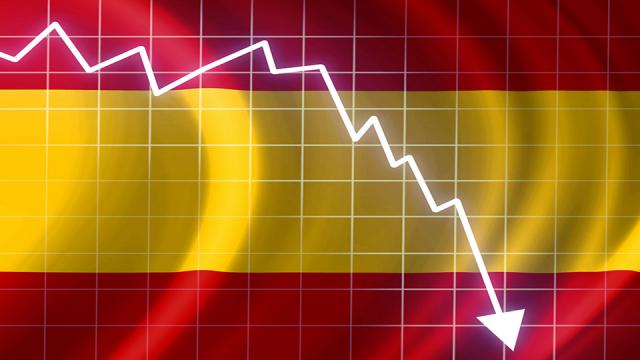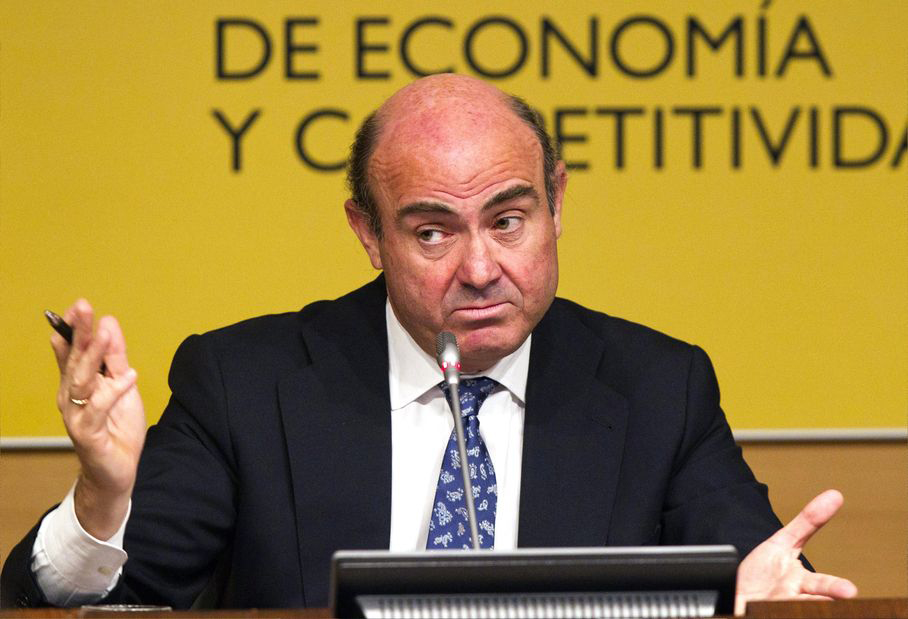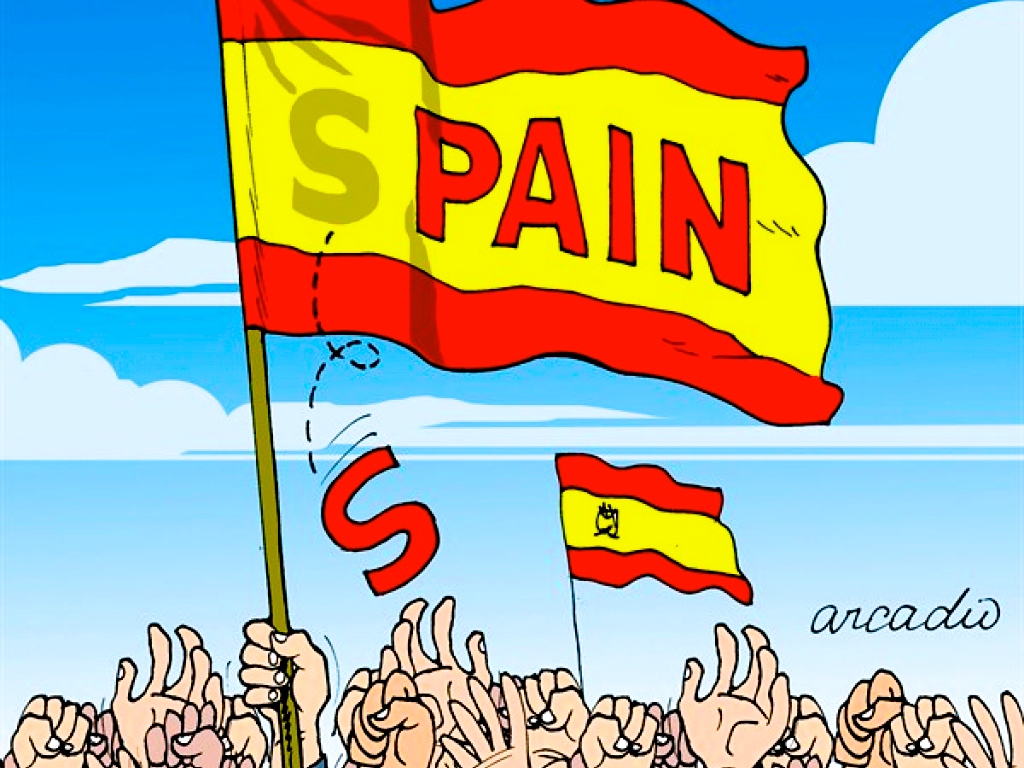
In 2002, Spain's conservative Prime Minister, José María Aznar, declared Spain ready and willing to join the G8 nations, reinforcing Spaniards' trust and optimism for more growth in the country's then-booming economy. Five years later, in 2007, socialist Prime Minister José Luis Rodríguez Zapatero declared that Spain was in the “Champions League” of world economies.
By this time, though, the magic was wearing off. Spaniards were beginning to doubt the model of continuous, unstoppable economic growth — and the fact that buying and selling houses was the world's best business. Fast forward to 2010 and you had the same socialist prime minister presenting the country with its worst cutbacks in services of the last 50 years — where the only thing being socialized were the costs of the country's neoliberal “financial shock-therapy.”
Then, in 2012, conservative Prime Minister Mariano Rajoy announced before Parliament that the Spanish financial sector was to receive a “loan” – according to him it was not a “rescue” – from the European Union to the tune of $50 billion. Spaniards had already swallowed the “therapy pill,” and were reminded to keep their mouths closed.
It wouldn't be so different if I had written the above chronology in reference to Portugal, Italy or Greece. In all of these southern European countries with Catholic (or Orthodox) roots and recent histories of dictatorships, the “medicine” has been essentially the same. However, the case of Spain may be the trickiest due to the country's amazing, widely admired growth it enjoyed, along with Ireland, during the first seven years of the new century.
Just as two decades ago Latin American, African and Asian countries were “laboratories” for the Structural Adjustment policies promoted by the IMF, nowadays Western Europe – and especially the eastern and southern regions – have become that “laboratory.” The formula is the same: dismantle the public sector, invoke massive layoffs and pension reforms, and race to the social bottom in favor of financial investment.
The idea, or conviction, promoted throughout these economic experiments is that there is no alternative. But we have clearly reached a point where the majority are asking whether the current austerity measures are working, who is paying the true costs of the crisis, and whether there are in fact alternatives?
Who Pays the Real Costs?
If the Spanish financial sector was the main actor involved in the housing bubble and it got a $50 billion bailout, isn't it logical to ask that sector to receive the “austerity treatment” instead of the whole society? Put more directly: if the surplus and profits were privatize during the boom years, why are the costs socialized in the bust years?
Here are a few statistics to bring people up to speed:
The assets of the Spanish banking sector are currently 3.3 times the amount of total Spanish GDP. In recent years, the government – that means Spaniards – spent billions to bail out the financial sector. Now, the government admits that around $40 billion have been lost and are not coming back. By contrast, the cutbacks to education and health are around $13 billion.
Around 300,000 individuals in Spain invested their savings in a new financial product called preferred shares, or preferentes. The “preferentes” were supposed to generate a 7% interest rate, but of course that was a trick. People's investments in preferentes helped the Spanish financial sector accomplish its capital requirements, and when everything blew away with the financial crash, those savings disappeared as well.
“I want my money back!!” investors screamed. “That's not possible,” answered the bankers. People's claims total around $10.3 billion for the preferentes scam. The most affected were pensioners and working class people, whose futures remain in limbo.
During last 13 years, around 800 cases of corruption involving more than 500 city halls throughout the country have been discovered. The vast majority of these scandals related to the housing bubble and financial institutions. The result: as the political system comes under increasing judicial scrutiny, the judicial system is becoming more and more politicized.
So just how much money have the main financial actors in Spain, including banks and saving banks, gained since the crash? The answer is an astonishing $130 billion.
Don’t Be Shy. Tax ’Em (They Deserve It!)
As citizens, must we believe and accept that the payment for these years' speculation falls on us? Of course not. Are there solutions? Of course there are. Two of the most known ones can be implemented immediately with enough social pressure and political will.
According to the Tax Justice Network, the loot from Spain that's been placed in tax havens totals more than $700 billion, almost half of Spain's GDP. If taxed, that money would generate more than $115 billion. The total amount of cutbacks in Spain have topped $110 billion. According to most, the math makes sense, and so does the moral logic.
After all, who is putting money in the tax havens? Answer: the biggest companies in the Spanish Stock Market (IBEX35). In fact, in 2012, 92% of IBEX35 companies held money in tax havens, among the most important being Spain's two largest banks: Banco de Santander and Banco Bilbao Vizcaya.
Are the giant companies the only ones keeping their money offshore? Of course not. Those 800 corruption cases mentioned earlier all have one thing in common: the relocation of money to havens in places like Amsterdam, Andorra, Monaco, Luxembourg, Cyprus, Switzerland, London or elsewhere.
This means that if Spanish and/or European governments pushed for disclosure of the money kept in these jurisdictions – and demanded an end to bank secrecy – structural economic changes would happen, and fast. The tricky point here is this: the international and intergovernmental body charged with controlling and ultimately eliminating this financial loophole is the Organization for Economic Cooperation and Development, or OECD. Which governments control the OECD? The U.K., Switzerland, U.S., France, etc. So good luck with that.
Another perhaps more likely option is the implementation of a Financial Transaction Tax, a.k.a. Tobin Tax. An FTT is a tiny tax on any transaction of shares, bonds, derivatives or currencies. It is already in place in more than 30 countries (U.S., U.K., Brazil, Hong Kong, etc.) and 11 European countries are currently trying to implement it through an adhoc mechanism in the EU known as Enhanced Cooperation Procedure.
However, the FTT is receiving fierce attacks from the financial sector and its lobbies, not to mention that one of its main advocates – the French socialist government – is sending contradictory messages about its intentions once the implementation moment arrives.
Surprisingly, the Spanish government is included as one of the 11 countries engaged in the ECP process, although the government has adopted something of an "ostrich strategy" on the issue, avoiding providing any direct, concrete details about its support or opposition to the measure.
What we do know is that the first movements on FTT implementation in Spain were only communicated to the Spanish Banking Association; that FTT petitions to Parliament by different political parties were ignored; and that some studies have reported if the tax were implemented it would collect around $7 billion annually. We also know that the FTT would help reduce speculation, decrease systemic economic failures and improve regulation of financial markets.
“Those Crazy Guys Calling for Social Justice”
Now that we have taxation of financial sector transactions and an end to tax secrecy on the formal “agenda,” what's missing is the political will and courage to implement those measures. The next step is social pressure to force politicians to act. Civil society organizations on a Spanish, European and global level are at work doing the same; groups like ATTAC, the Robin Hood Tax Campaign, Tax Justice Network, UBUNTU Forum, Stamp Out Poverty, National Nurses United and others are engaging in strong advocacy and lobby work to realize these measures in the political arena.
At the same time, journalists and analysts are playing a growing role, helping not only to expose the crimes of tax evaders – such as the massive offshore leaks report that was published earlier this year by the International Consortium of Investigative Journalists – but enabling the public to clearly understand core financial arguments behind the tax regulations and financial tax.
All of this work, by activists, educators and civil society groups worldwide, is key to reshaping the economic agenda and forcing the public's will on decision makers. But huge work lies ahead, as our politicians remain as tied as ever to the financial sector, deeply corrupting their interests and the essence of state power.
As Upton Sinclair said almost a century ago, “It is difficult to get a man to understand something, when his salary depends on his not understanding it.” The social movements that have emerged globally in recent years to challenge financial-political collusion are a reminder of how true Sinclair's words ring today.
3 WAYS TO SHOW YOUR SUPPORT
- Log in to post comments

















